In Which We Can't Say No To It Later
 Tuesday, September 9, 2008 at 12:54PM
Tuesday, September 9, 2008 at 12:54PM This is the first essay in our series about New York.

Ted Berrigan, by Alex Katz.
Nice to See You
by WILL HUBBARD
This week a good friend of mine gave me a wonderful book. It’s called Nice to See You: Homage to Ted Berrigan, and includes an abundance of worthwhile insight into one particular circle of friends operating just after the publication of Donald Allen’s New American Poetry anthology.

They are mostly Berrigan’s friends and associates, people like Ron Padgett, Clark Coolidge, Donna Dennis, Larry Fagin, Philip Whalen, Dick Gallup, Anne Waldman, Anselm Hollo, along with the familiar crowd of Robert Creeley, Allen Ginsberg, and Frank O’Hara present as well.

Berrigan seemed to have a particular way of bringing folks together to listen, and all included in this collection of prose and verse seem to have found much excitement in his life and work.

"Red Shift" - Ted Berrigan (mp3)
"Today in Ann Arbor" - Ted Berrigan (mp3)
You can listen to more of Ted at UbuWeb.

Certain Slant of Sunlight
by Ted Berrigan
In Africa the wine is cheap, and it is
on St. Mark's Place too, beneath a white moon.
I'll go there tomorrow, dark bulk hooded
against what is hurled down at me in my no hat
which is weather: the tall pretty girl in the print dress
under the fur collar of her cloth coat will be standing
by the wire fence where the wild flowers grow not too tall
her eyes will be deep brown and her hair styled 1941 American
will be too; but
I'll be shattered by then
But now I'm not and can also picture white clouds
impossibly high in blue sky over small boy heartbroken
to be dressed in black knickers, black coat, white shirt,
buster-brown collar, flowing black bow-tie
her hand lightly fallen on his shoulder, faded sunlight falling
across the picture, mother & son, 33 & 7, First Communion Day, 1941 -
I'll go out for a drink with one of my demons tonight
they are dry in Colorado 1980 spring snow.
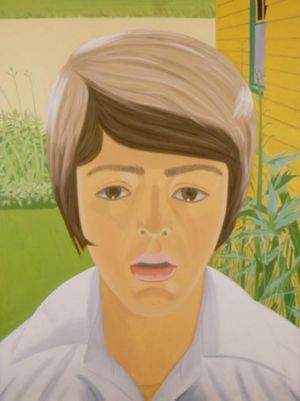
Nation review of Ted's collected:
If you read about Berrigan, you're bound to learn about his reckless treatment of his body and his ghastly diet (he subsisted mostly on Pepsi, greasy hamburgers and peanut butter sandwiches), or about how he forged prescriptions to buy the many milligrams of speed that fueled his marathon sessions of writing, reading, talking and pontificating. Such snapshots of Berrigan's personal life are meaningful, but they provide little guidance for anyone trying to grasp how the words Berrigan wrote continue to live beyond the life he led, an undertaking made more difficult as only a relatively small amount of Berrigan's poetry has remained in print since his death.
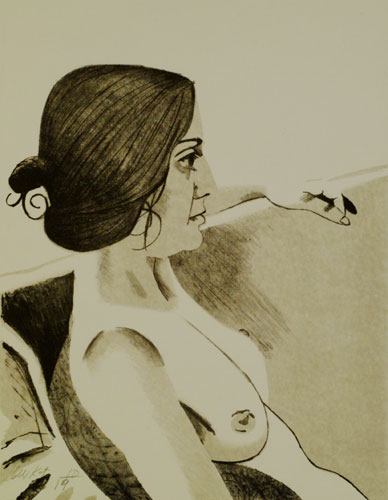
Though his first major collection of poems, The Sonnets, did not come out until 1964, and was thus late for the New American Poetry, I was disappointed to learn that Berrigan has been ‘edited out’ of many of the major anthologies of 20th century poetry, including the Norton.

Years ago I went to Providence’s lovely John Hay Library and read The Sonnets all the way through. Not only is the Hay’s copy remarkable—one of the original 300 numbered, staple bound copies, bearing the imprint of Ron Padgett’s own original typewriter transcription—the poems themselves stand out to me as a major achievement in contemporary verse.

In the book, which lasts 88 sonnets, Berrigan creates series of poems that deal in a recurring currency of images, each poem a development or interpretation of the poems preceding, and often including several of the lines of the previous poems verbatim but in alternate location. Berrigan also lifts lines from the poems of his friends—Padgett, Gallup, and O’Hara especially—achieving a collage effect, but also demonstrating the intimacy of this particular group of New York poets.

"To Jack Kerouac" - Ted Berrigan (mp3)
There are other innovative reconceptions of the sonnet form as well, and I include below sonnet XV in which Berrigan has employed his scissors more than his pen:
Sonnet IV
by Ted Berrigan
In Joe Brainard's collage its white arrow
he is not in it, the hungry dead doctor.
Or Marilyn Monroe, her white teeth white--
I am truly horribly upset because Marilyn
and ate King Korn popcorn," he wrote in his
of glass in Joe Brainard's collage
Doctor, but they say "I LOVE YOU"
and the sonnet is not dead.
takes the eyes away from the gray words,
Diary. The black heart beside the fifteen pieces
Monroe died, so I went to a matinee B-movie
washed by Joe's throbbing hands. "Today
What is in it is sixteen ripped pictures
does not point to William Carlos Williams.
What gems have to do with spas is revealed in a sonnet that was never written.

This poem is difficult, but rewarding I think, to read in order. Now try it by reading the first line, then the last line, then the second line, then the second to last line, etc. Though this reading is easier, it does not achieve the avoidance of rational sense that the top-to-bottom reading does. Top-to-bottom, we do not hear the narrative but we hear the emotions contained within the images, and the way Berrigan has arranged the lines in sonnet XV allows, I think, a much more complex emotional experience than if the lines were in correct order.
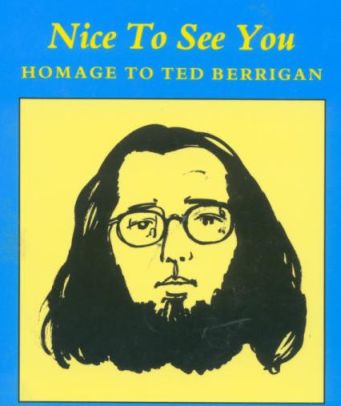
Berrigan’s favorite line in The Sonnets: “Fucking is so very lovely/ who can say no to it later?” Reading that poem again now, hearing it begin with “Everyone is suddenly pregnant”, I cannot disagree.
Last Poem
by Ted Berrigan
Before I began life this time
I took a crash course in Counter-Intelligence
Once here I signed in, see name below, and added
Some words remembered from an earlier time,
"The intention of the organism is to survive."
My earliest, & happiest, memories pre-date WW II
They involve a glass slipper & a helpless blue rose
In a slender blue single-rose vase: Mine
Was a story without a plot. The days of my years
Folded into one another, an easy fit, in which
I made money & spent it, learned to dance & forgot, gave
Blood, regained my poise, & verbalized myself a place
In Society. 101 St. Mark's Place, apt. 12A, NYC 10009
New York. Friends appeared & disappeared, or wigged out,
Or stayed; inspiring strangers sadly died; everyone
I ever knew aged tremendously, except me. I remained
Somewhere between 2 and 9 years old. But frequent
Reification of my own experiences delivered to me
Several new vocabularies, I loved that almost most of all.
I once had the honor of meeting Beckett & I dug him.
The pills kept me going, until now. Love, & work,
Were my great happinesses, that other people die the source
Of my great, terrible, & inarticulate one grief. In my time
I grew tall & huge of frame, obviously possessed
Of a disconnected head, I had a perfect heart. The end
Came quickly & completely without pain, one quiet night as I
Was sitting, writing, next to you in bed, words chosen randomly
From a tired brain, it like them, suitable, & fitting.
Let none regret my end who called me friend.
Berrigan thought that Frank O’Hara was the only poet he needed to read for inspiration—“Everything is there!”

He was right, and made good on that insight, extending O’Hara’s project of immediate verbal engagement:
Sonnet XXXVI
by Ted Berrigan
after Frank O’Hara
It’s 8:54 a.m. in Brooklyn it’s the 28th of July and
it’s probably 8:54 in Manhattan but I’m
in Brooklyn I’m eating English muffins and drinking
pepsi and I’m thinking of how Brooklyn is New
York city too how odd I usually think of it as
something all its own like Bellows Falls like Little
Chute like Uijongbu
I never thought on the Williams-
burg bridge I’d come so much to Brooklyn
just to see lawyers and cops who don’t even carry
guns taking my wife away and bringing her back
No
and I never thought Dick would be back at Gude’s
beard shaved off long hair cut and Carol reading
his books when we were playing cribbage and
watching the sun come up over the Navy Yard
across the river

Williamsburg Bridge, 1904.
I think I was thinking when I was
ahead I’d be somewhere like Perry street erudite
dazzlingly slim and badly loved
contemplating my new book of poems
to be printed in simple type on old brown paper
feminine marvelous and tough

Will Hubbard is the contributing editor to This Recording. He is a writer living in Williamsburg. Would you like to know more?

"Cheney's Toy" - James McMurtry (mp3)
"Freeway View" - James McMurtry (mp3)
"Hurricane Party" - James McMurtry (mp3)
"Ruby and Carlos" - James McMurtry (mp3)
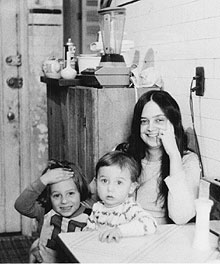
Ted's wife Alice Notley, Anselm, & Edmund Berrigan.
PREVIOUSLY ON THIS RECORDING
Unplayed Piano. I can still hold a tune.
Becca on kid art.
Our Midwest correspondent chimed in.
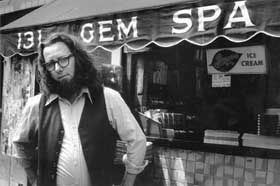






























Reader Comments (6)
It's no accident that Berrigan "got edited out" of so many anthologies. Save for the Allen and for Controversy of Poets (where Robert Kelly is guilty is omitting him) almost all the others of that period that were not NY School specific were pure School of Quietude projects.
Try the Norton Postmodern or Messerli's lively but jumbled Poems from the Other Side of the Century for a more balanced view of American lit in the 2nd half of the 20th century.
[...] In Which We Can’t Say No To It Later [...]
If only more sonnets were reconceived to include Joe Brainard.
[...] Who made you the boss? [...]
[...] Hubbard is the contributing editor to This Recording. He last wrote in these pages about the poet Ted Berrigan. He hardly ever posts anything of verifiable interest [...]
[...] Part One (Will Hubbard) [...]